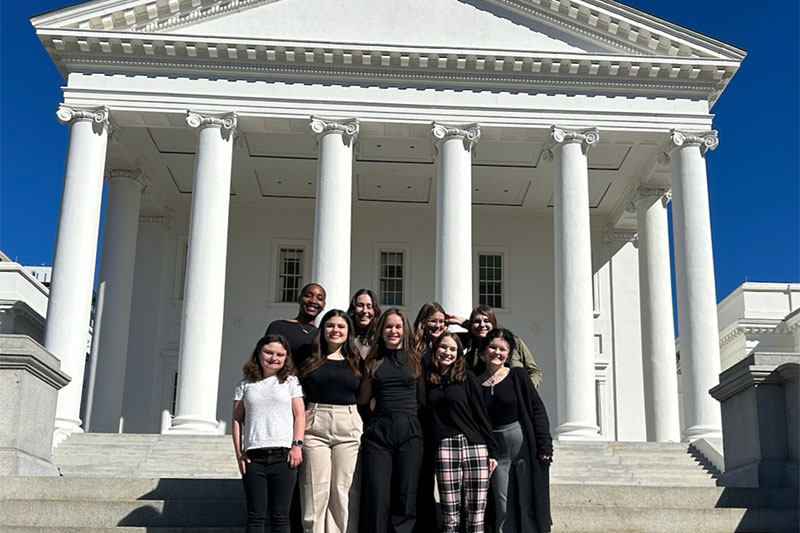
Read time:
Learning how laws are made is part of being a good citizen.
But being involved in the process and advocating for issues of community importance takes it to another level.
For a group of 16 Social Work students, spending the day in Richmond proved to be both enlightening and empowering. The students, armed with research and strong opinions, met with their hometown legislators, educating them and convincing them to support bills about which they are passionate.
“Being able to advocate on behalf of others and make a lasting change has been by far one of the best experiences throughout my education at CNU,” said Kendra Bush, ‘25 Social Work.
Bush was one of the students who traveled to the state capital for Legislative Advocacy Day to make their voices heard on legislation affecting social work concerns.
“My hope is that students learn how to practice effective professional engagement with stakeholders and legislators and how to formulate and communicate an opinion on a policy utilizing reliable data combined with a powerful personal story,” said Dr. Diane Griffiths, Director of the Social Work Program.
Bush advocated for a bill that increases the age limit of the Fostering Future program from 21 to 23, which is available to teens and young adults in foster care after they turn 18.
“From this experience, I learned a vast amount about policy and how the full process works,” Bush said. “I also gained vital skills in regard to lobbying and advocating for others through meeting with my senator and delegate as well as creating leave-behind fliers.”
Advocacy Day is a part of the Social Policy class, a required course in the social work curriculum. It has taken place every year for more than a decade.
“It is important because advocacy and social policy are cornerstones of the social work discipline,” Griffiths said.
Bush said the day was “a huge eye-opener for me.”
“Prior to it, I had no interest in macro-level social work. However, after participating in Advocacy Day, my mindset has completely changed,” she said.
Bush felt very strongly about her bill, saying that the goal of it would be to allow youth to stay in the Fostering Futures program longer “in order for them to complete their education, manage their mental health, get their driver’s license, cope with trauma, and many more vital things that would allow for them to be successful independently.”
Students prepared for Advocacy Day by doing research on their chosen topic and constructing a case for or against it. They made appointments with legislators who represented their hometowns, and upon meeting them, made their presentations.
“Through this experience, I learned how important it is for people form the public to come in and advocate and tell their stories because I saw the way legislators’ faces, ideas and body language changed when they heard from people who would be directly impacted by the bills that were being voted on,” said Rian Sherod, ‘25 Social Work.
Sherod advocated for a bill that would require the Department of Criminal Justice to create an in-service training program on autism that law enforcement would be required to take.
“The bill is really important to me because I have a younger cousin with autism, and I would hate for him to be another person who had a negative encounter with the police because of law enforcement not being properly trained and educated on his disability.”
For the students, the day proved to be both energizing, and a bit nerve wracking at times, as they presented to the legislators. They saw a side to the legislative process that they had not witnessed before.
“There was a lack of formality between the legislators that really surprised me. They are sassy and sarcastic with each other, and they would make jokes in the middle of sessions, which I didn’t expect at all,” Sherod said. “I figured they would be very formal and rigid.”
The reactions the students received to their stances on the bills was mixed, some legislators indicating they were very much in favor and others making clear that they did not anticipate voting in a way that would support the bills in question. No matter the reactions they received from the lawmakers, the students quickly realized the value of making their voices heard and the power their advocacy efforts carried.
“You see the importance of these skills,” Griffiths told the students. “It’s important to be kind, listen and look for common values to build on in order to get what people need.”